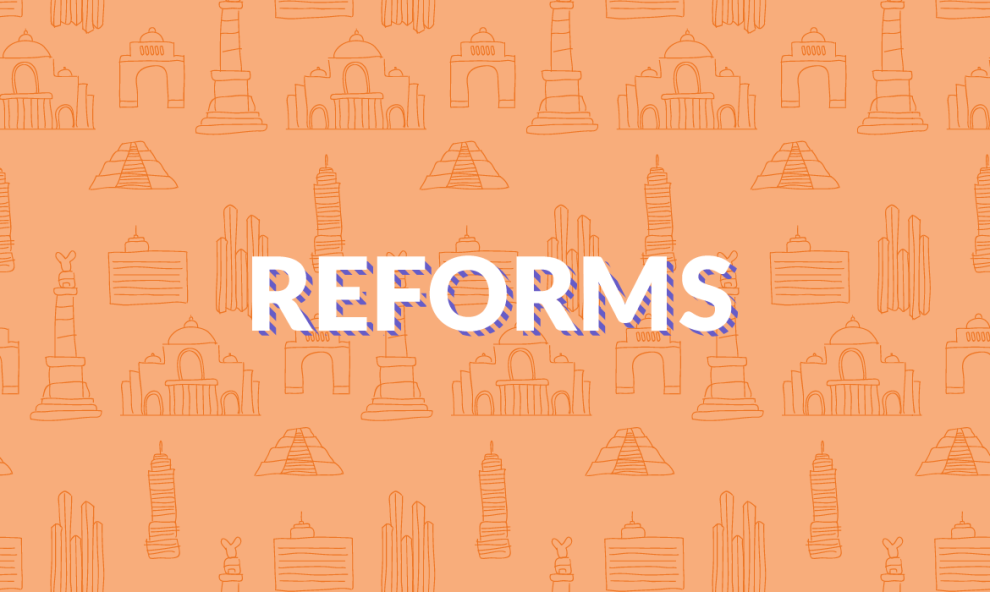Reflecting on his efforts as prime minister and reformer during Russia’s post-Soviet stage, Viktor Chermomyrdin made an axiomatic affirmation that is as applicable to Mexico as it was to his own country: “We wanted the best but it turned out as always”. Many of the reforms that have been undertaken in Mexico over the past thirty years heralded the best but ended up the same: insufficient; limited, and often biased toward special interests whether political, bureaucratic or private. Now that we’re in election season, we will hear many proposals of change and reform. As citizens, the mandatory question is which of the candidates is really capable of carrying off a change for the good.
The core theme is that Mexico is stuck for many reasons, including the pessimism that paralyzes everything, but I have no doubt that the main limitation is concerned with the ties that bind, which bar innumerable opportunities for development from materializing. Some of these have to do with the physical structure of the government, others with the isolation experienced by an important part of the industrial sector on which an overwhelming part of employment depends. The country requires a great transformative vision of change that makes it possible for the population to assume itself as part of the process and one from which specific reforms emerge that, thanks to effective leadership, allow this to materialize.
Elections are unique opportunities for candidates to explain their proposal of government and to convince the electorate why it is that they deserve to be favored by the voters. One way of evaluating their proposals is to review the integrity of these. Another would consist of observing what the candidates did as public officials in their previous activities. It would also be relevant to analyze the dynamic that characterizes their parties and to what degree this constitutes a facilitating or limiting factor.
Campaigns are an exercise in marketing: they promote the candidate as a “product” in the form of proposals to achieve the objectives that they set forth. As voters, our responsibility is that of evaluating the reasonableness and viability of what they offer us. Like the so-called “miracle” products advertised on late-night TV, candidates inevitably, but logically, propose solutions that appear to be perfect. The question is whether they are viable.
Taking in the panorama, the general objectives that the candidates propose are not very distinct among themselves: they propose a developed society and a generalized transformation. I ask myself whether we should believe them. The PRI candidate implicitly argues that members of his party “do indeed know how to achieve it”. However, seventy years in government prove that they couldn’t. The candidate for the PAN presents an array of proposals that clash with the experience of the last twelve years. The PRD candidate vows to recreate the vision of development of the seventies, a time during which there were some four years of high growth rates, but followed by years or decades of depression.
The candidates for the PRI and the PAN propose the need to carry out a series of reforms. Both subscribe to ideas like converting the oil sector into a kick-starter for development and transforming the internal market. Although there are many differences that reflect contrasting views on the relationship between government and society, this concerns proposals that, in the immediate term, are not radically distinct. Where there is a perceptible difference is in the manner in which they propose to achieve it: the PRI candidate proposes the constitution of an “effective” government, capable of achieving what the past three governments could not. For her part, the PAN candidate proposes a “coalition government” as a means of joining distinct forces and political interests together in one cabinet. The PRD candidate has been more circumspect about how he would do it, presumably relying on the strength of his personality as the engine.
None has explained how his or her proposal makes sense given the history that precedes them. Peña-Nieto’s proposal reminds me a lot of the Carlos Salinas presidential term during which the country underwent a great transformation in the nature of the government. For the first time in decades we had a government that understood the world as it was, that the economy could no longer be managed as if the country were a Mom and Pop variety store at the service of the bureaucracy and proposed raising the growth rate through private investment. Something like this is what this current presidential candidate did as state governor. However, viewed in retrospect, what Salinas did, but above all what he didn’t do, was revealing of the limitations of a PRIist government: steeped in political, group, and union interests, the PRI could not reform what is today stuck in key places such as PEMEX, CFE, the SEP, the relationship of the Federal Government with the states, the judiciary, and other sectors and activities crucial for development. Salinas’s government revolutionized part of the private-sector economy but did not transform the economy in general or the political or governmental structure to a great extent because he was structurally impeded from doing this. The question is whether this saturation of interests committed to the status quo has changed because, if it has not, the reforms that their candidate proposes would be impossible.
Josefina Vázquez-Mota’s proposal is perhaps more ambitious than that of Peña-Nieto but finds itself up against a similar situation: after twelve years of her party’s incompetent governments, how would it be that her proposal would entertain a greater possibility of achieving the objectives that she proposes? The PANist governments did not make good on a change of regime nor did they construct an innovative and distinct political or governance structure. Without doubt, there are some exceedingly meritorious advances that were the product of those years, such as transparency and access to information, but the promised change never came about.
The case of López-Obrador in somewhat different because this candidate does not propose any reforms but rather the recreation of a scheme of governmental rectorship that would imply a core modification of the government-economy relationship and an inevitable confrontation with the industrial scheme constructed around the NAFTA. His challenge will be to explain how, by his doing the same thing, we could expect something distinct.
The candidates owe the citizens an explanation of why they have the key to the solution for the country’s problems at this moment and of how this is different from what their predecessors did and achieved. It is not the past that determines the present or the future, but in the absence of other bellwethers, this particular one is exceedingly relevant.
Who’ll Reform?





Comments